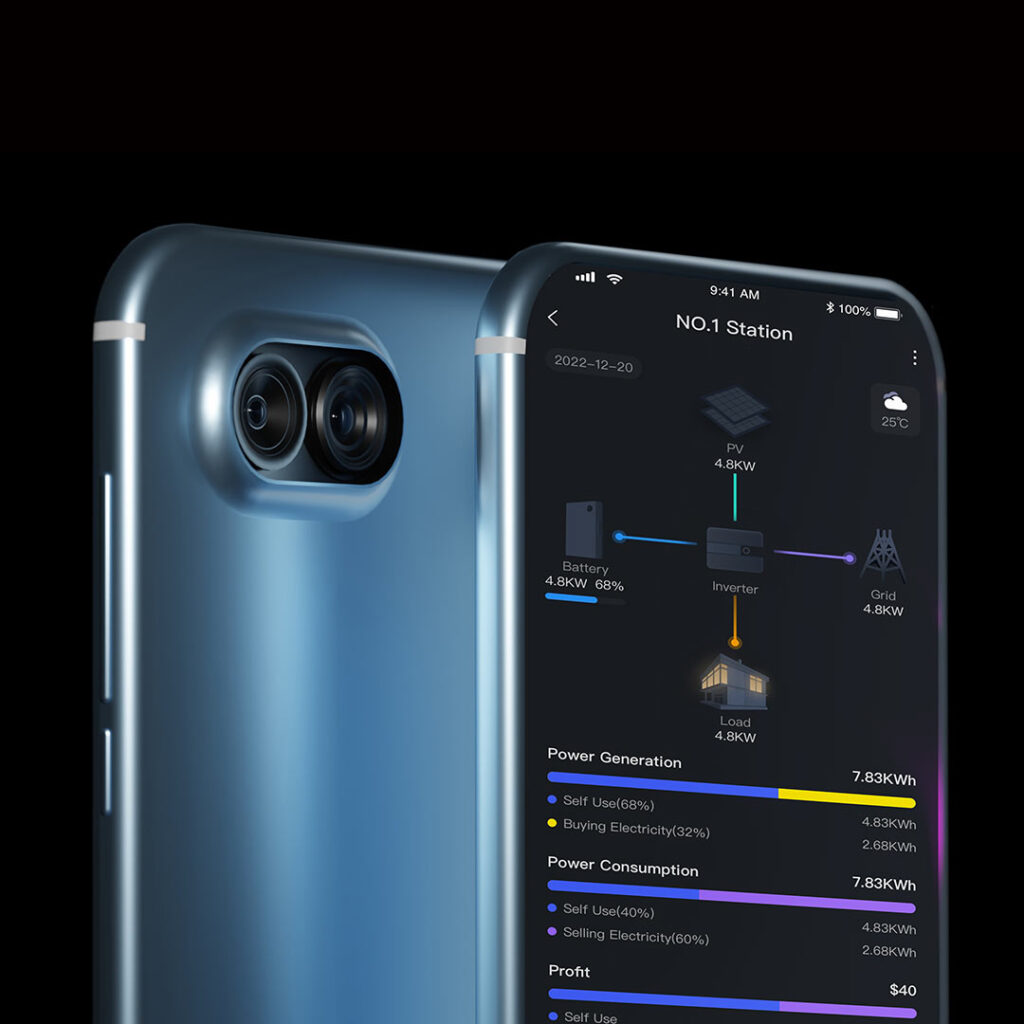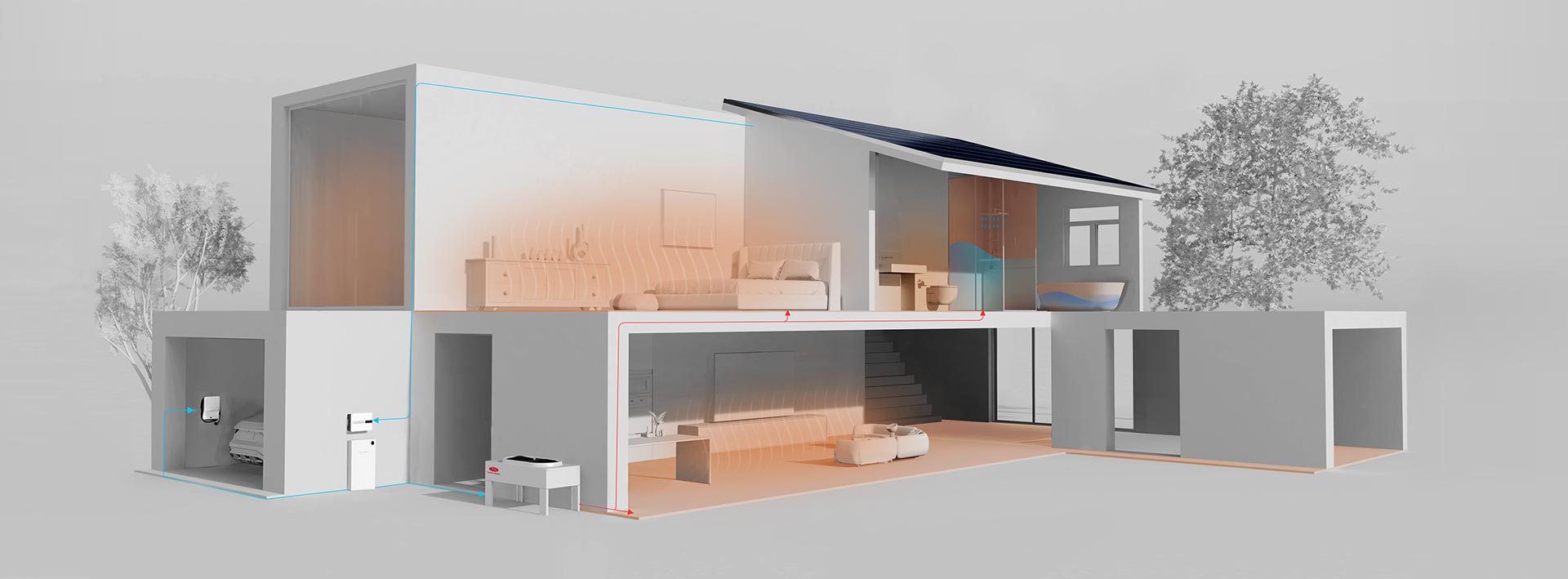PCS-3-8kW-25A-1
Three-phase inverter for private households & commercial use
maximum efficiency
Loading and unloading
Max. PV efficiency
PCS-3 series
Short Facts
The inverter does it itself generated electricity can only be used. He walks the one gained by the PV system, direct current to alternating current.
Reliable operation
Higher quality and more powerful Hybrid inverter with 10 years Product Guarantee.
Stylish design
Timeless & minimalist design. OLED display.
Smart management
Integrated energy management System for maximum efficiency.
WIFI
Real-time monitoring and control via app and web application.
Flexible installation
Horizontal design and snap-in Terminal configuration for easy installation and maintenance.
Everyone who feeds in the electricity generated by their PV system needs an inverter
or would like to use it for typical household electronic devices.
Why is that? Photovoltaic systems generate direct current. The mesh and almost all the usual. However, electronic devices require alternating current. The task of the inverter is
to convert the direct current obtained from the PV modules into alternating current. A
Inverters are therefore an essential part of almost every system.
Innovative and future-oriented
The technology at a glance
With a maximum efficiency of 97.6%
Stay connected - with everything
DM Smart Energy App
Monitor, Optimize, Save.
Adapt personal settings and specifications

Simple, fast and uncomplicated:
Benefit from easy commissioning via app and the integrated automatic
performance data backup.
Comfortable and reliable:
Real-time data collection through module-level monitoring. Clear presentation of Power generation and energy flow, as well as straightforward device and report management.
The power grid is very sensitive to voltage and frequency changes, which is fast
can lead to network overload. The inverter monitors these parameters
permanently and automatically disconnects the PV system from the power grid if one of the limit values is exceeded. The system itself is also monitored by the inverter. Voltage, current and performance data are always measured, which
Malfunctions or problems can be identified quickly. In addition, data on performance and yield can be viewed in order to be able to optimize self-use and feed-in.
PCS-3-8kW-25A
Private households
PV input data
Max input power: 12.8kW
Starting voltage: 135V
Battery parameters
Battery type: lithium battery (with BMS)
Voltage range: 65-450V
Max. charging and discharging current: 30A / 30A
Conformity
IEC/EN62109 / IEC/EN61000 /
EN50549-1 /
TOR Generator Type A / VDE-AR-N-4105
Height and weight
L x W x H
534 mm x 418 mm x 210 mm
27 kg
PCS-3-10kW-25A
Private households
10kW
98.2% / 97.4% (EU)
PV input data
Max input power: 12kW
Starting voltage: 135V
Battery parameters
Battery type: lithium battery (with BMS)
Voltage range: 135-750V
Max. charging and discharging current: 20A / 20A
Conformity
IEC/EN62109 / IEC/EN61000 /
EN50549-1 /
TOR Generator Type A / VDE-AR-N-4105
Height and weight
L x W x H
534 mm x 418 mm x 210 mm
27 kg
PCS-3-10kW-40A
Commercial
10kW
98.4% / 97.5% (EU)
30A / 30A
16.5A
PV input data
Max input power: 15kW
Starting voltage: 135V
Battery parameters
Battery type: lithium battery (with BMS)
Voltage range: 135-750V
Max. charging and discharging current: 40A / 40A
Conformity
IEC/EN62109 / IEC/EN61000 /
EN50549-1 /
TOR Generator Type A / VDE-AR-N-4105
Height and weight
L x W x H
534 mm x 418 mm x 210 mm
27 kg
PCS-3-12kW-40A
Commercial
12kW
98.4% / 97.5% (EU)
30A / 30A
20A
PV input data
Max input power: 18kW
Starting voltage: 135V
Battery parameters
Battery type: lithium battery (with BMS)
Voltage range: 135-750V
Max. charging and discharging current: 40A / 40A
Conformity
IEC/EN62109 / IEC/EN61000 /
EN50549-1 /
TOR Generator Type A / VDE-AR-N-4105
Height and weight
L x W x H
534 mm x 418 mm x 210 mm
27 kg
PCS-3-15kW-40A
Commercial
15kW
98.4% / 97.5% (EU)
30A / 30A
25A / 20.73A
PV input data
Max input power: 22.5kW
Starting voltage: 135V
Battery parameters
Battery type: lithium battery (with BMS)
Voltage range: 135-750V
Max. charging and discharging current: 40A / 40A
Conformity
IEC/EN62109 / IEC/EN61000 /
EN50549-1 /
TOR Generator Type A / VDE-AR-N-4105
Height and weight
L x W x H
534 mm x 418 mm x 210 mm
27 kg
PCS-3-20kW-40A
Commercial
20kW
98.4% / 97.5% (EU)
30A / 30A
33.5A
PV input data
Max input power: 30kW
Starting voltage: 135V
Battery parameters
Battery type: lithium battery (with BMS)
Voltage range: 135-750V
Max. charging and discharging current: 40A / 40A
Conformity
IEC/EN62109 / IEC/EN61000 /
EN50549-1 /
TOR Generator Type A / VDE-AR-N-4105
Height and weight
L x W x H
534 mm x 418 mm x 210 mm
27 kg

Hot water throughout the house
Fact is: Generating hot water with old central heating systems requires a lot of energy and is therefore very expensive. The DM heat pumps prepare hot service water in a particularly energy-saving, cost-effective and climate-friendly manner - 24 hours a day, 365 days a year.
The e-charging station
No more refueling, no more stress and no more frightening glances at the petrol price display at petrol stations. With a charging station, you can charge your electric car conveniently and cheaply at home. The charging station is powered by the power storage unit, which also makes the generated PV power available for use at night.
The energy storage system
The Dream Maker energy storage system ensures efficient conversion, accumulation and distribution of electrical energy generated by the PV system. The battery management system continuously monitors and optimizes performance data.
The underfloor heating
The combination of heat pump and underfloor heating is very popular - but why is that? Underfloor heating is very economical to operate and still ensures a high level of thermal comfort. Due to the large area distribution, the combination of underfloor heating and heat pump enables very low flow temperatures, which increase the efficiency of the heat pumps and reduce heating costs.
The photovoltaic system
Photovoltaic systems are the core of a decentralized and independent energy supply. PV systems are climate-friendly and are therefore one of the most important technologies for a climate-neutral future. It supplies your entire household with green electricity.
Heating & cooling with solar power – how to make your own home almost self-sufficient with a photovoltaic system, power storage and heat pump: For a single-family home, the combination of a PV system and heat pump is worthwhile. The photovoltaic system generates inexpensive electricity from solar energy, which you use to operate of the heat pump can use. The low flow temperature of underfloor heating further minimizes your power consumption and at the same time increases the efficiency of the heat pump. The power storage complements this combination and ensures that excess Solar yields are stored and then made available to you when they are needed. In this way the degree of self-sufficiency of your property can increase by up to 80%.

